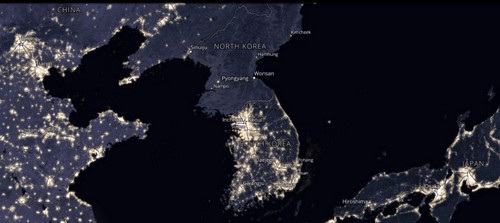North Korea, officially known as the Democratic People’s Republic of Korea (DPRK), remains one of the most isolated countries in the world. This isolation extends to its citizens, raising the crucial question: Can People From North Korea Travel freely? The reality is complex and tightly controlled by the ruling elite, impacting various aspects of life, including the ability to travel internationally or even domestically.

Satellite image illustrating the stark contrast between North and South Korea at night, highlighting the isolation of North Korea.
Travel Restrictions Within North Korea
Even within North Korea, movement is not unrestricted. Citizens generally require travel permits to move between different regions. These permits are difficult to obtain and are subject to intense scrutiny by authorities. The purpose of travel must be deemed legitimate by the state, such as official business, agricultural work, or visiting close family. Unapproved travel can lead to severe penalties.
International Travel: A Rare Privilege
International travel for ordinary North Koreans is exceedingly rare. The vast majority of citizens are effectively prohibited from leaving the country. Travel abroad is typically reserved for government officials, athletes representing the nation, individuals involved in trade or diplomacy, and those hand-picked to study or work overseas. Even those granted permission are heavily vetted and monitored throughout their trip. This tight control is a stark illustration of how the regime prioritizes political control above all else.
The Consequences of Unauthorized Travel
Leaving North Korea without official permission is considered a crime against the state. Those caught attempting to escape, or who are forcibly repatriated from neighboring countries like China, face severe consequences. These penalties can include:
- Brutal Beatings: Individuals may be subjected to physical abuse during interrogation and detention.
- Forced Labor: Escapees may be sent to labor camps, where they are forced to perform arduous tasks under harsh conditions.
- Torture: Torture is a common practice used to extract information or punish those deemed disloyal.
- Imprisonment in Political Prison Camps: Suspected dissidents and those who have attempted to flee may be incarcerated in political prison camps, where conditions are notoriously brutal and life-threatening.
- Forced Abortions: Women who become pregnant while attempting to escape to China may be subjected to forced abortions if repatriated.
The regime’s strict policy against unauthorized travel and its brutal treatment of those who attempt to leave underscore the desperate situation many North Koreans face and the lengths they will go to in search of a better life.
The North Korean Refugee Crisis
Driven by poverty, food insecurity, and a lack of freedom, countless North Koreans have risked their lives to flee to neighboring countries, primarily China. This has created a significant refugee crisis, with thousands attempting to escape every year.
“When I lived in North Korea, all I worried about was getting food.” – Joseph Kim, escaped North Korea in 2006
Despite the risks, many North Koreans see escape as their only option for survival and a chance at a life free from oppression. However, the journey is fraught with danger, and those who make it to China often face further exploitation and uncertainty.
Exploitation of Refugees in China
North Korean refugees in China are particularly vulnerable due to their illegal status. They fear detection and repatriation, which prevents them from seeking legal employment or protection. This vulnerability makes them susceptible to various forms of exploitation, including:
- Sex Trafficking: A significant percentage of North Korean women refugees are trafficked into the sex trade in China, forced to work in brothels or sold as wives.
- Labor Exploitation: Refugees may be forced to work in dangerous or exploitative conditions with little or no pay.
- Stateless Children: Children born to North Korean refugee mothers and Chinese fathers often face difficulties obtaining legal status, leaving them stateless and without access to basic rights.
A North Korean woman who was rescued from sex trafficking by LiNK (Liberty in North Korea).
The Role of International Actors
The international community plays a crucial role in addressing the North Korean refugee crisis and advocating for human rights within the country. Organizations like Liberty in North Korea (LiNK) work to rescue refugees and raise awareness about the plight of the North Korean people.
It’s imperative that the international community continues to:
- Advocate for the rights of North Korean refugees.
- Pressure the Chinese government to recognize North Korean defectors as refugees, not economic migrants.
- Support organizations that provide assistance to North Korean refugees.
- Raise awareness about the human rights situation in North Korea.
Conclusion: A Nation Trapped
The question of whether people from North Korea can travel reveals a deeply troubling reality. The vast majority of citizens are denied the fundamental right to freedom of movement, both within their own country and internationally. This restriction is a key tool used by the regime to maintain control and suppress dissent.
The ongoing refugee crisis and the exploitation faced by North Koreans who manage to escape highlight the urgent need for international attention and action. By advocating for human rights, supporting refugees, and raising awareness about the situation in North Korea, the international community can help to create a future where the North Korean people can finally enjoy the freedoms they deserve.